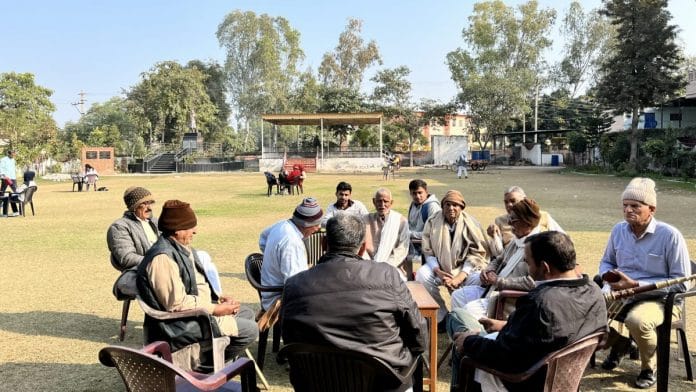Jind/Nuh/Meerut: Thousands of men travelled miles on cars and bikes to reach the Jat Dharmshala in Haryana’s Jind district last week with a singular goal of deciding the fate of women and marriages in India. The ‘Sarvakhap Mahapanchayat’ was prompted by the Narendra Modi government’s ambitious move to raise the legal age of marriage of women from 18 to 21.
The organiser, Dev Vrat Dhandha, reached out to the members of hundreds of Khaps spread across the state through social media, WhatsApp and phone calls. Around 100 Khaps and Tapas (one unit of a Khap panchayat) attended the programme. About thousand farmers, predominantly men, clad in white kurta-pyjama with shawls wrapped around their shoulders, shouted from the stage: “Ladkiyan 3 saal mein bhaag jayengi aur samaj mein bimariyan failayengi (Girls will elope within these three years and pollute the society).”
The big question on everybody’s mind was how to protect the sacred bloodlines and save teenage girls falling from grace.
“What will happen to our customs, rules and pride?” asked Phool Kumar Rathi, one of the attendees of the Mahapanchayat.
“Maa baap ko ye haq diya jana chahiye ki bigdi hui ladki ki shadi 18 ke baad kar sakein (Parents should be given the right to marry off their daughters who bring disgrace after 18),” said O.P. Dhankhar, head of Dhankhar Khap.
The prevailing sentiment at this mega event reflected deep, patriarchal anxieties in the rural and semi-rural areas of Haryana over women’s sexuality and choices. In the videos of the Mahpanchayat, moustached men can be seen saying things like — “Ladki ghar ki izzat hoti hai (The honour of the family lies on the girl)”; “Ek gaon aur ek gotra mein shadi ban honi chahiye (Marriage within the same clan and village should be banned)”; “College mein boyfriend banayengi aur hormones ke chakkar mein mahaul ganda karengi (They will make boyfriend if sent to college and due to hormones, they will corrupt other girls’ mind too).
They said a committee will be formed to talk to the government about the new ‘Prohibition of Child Marriage (Amendment) Bill, 2021’.
Just five kilometres away from the site of the Khap panchayat, young female students of the 41-year-old Hindu Kanya Mahavidyalaya in Jind dismissed all this brouhaha as ‘purani soch’ (old mindset). They said they belong to the era of ‘nayi soch’. The students, wearing salwar kameez and jeans and sweaters, excitedly spoke about new winter coats available in the local market and scrolled photos of young men on Instagram on their smartphones.
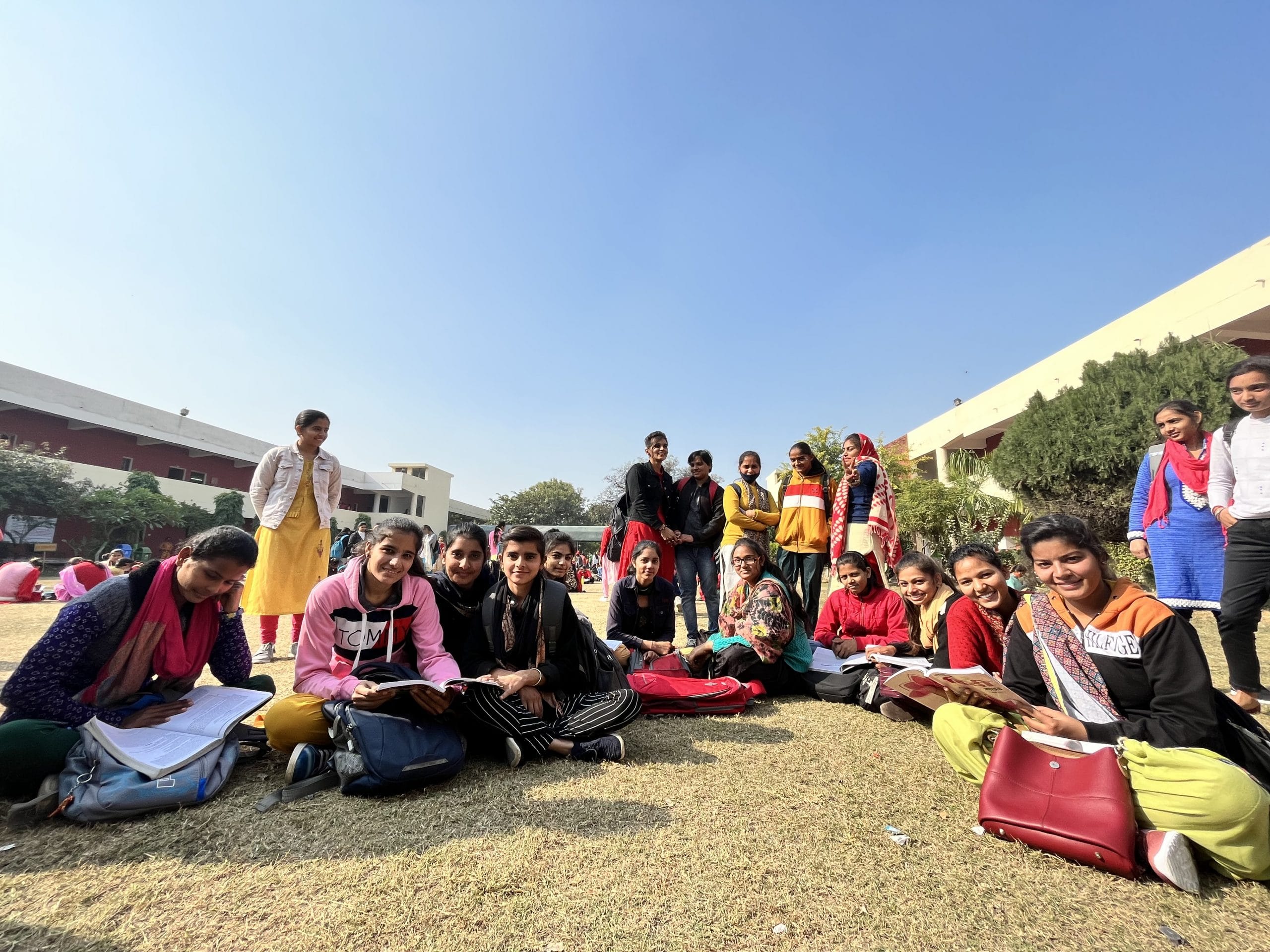
“It is a good decision. Every year we see parents asking for attendance relaxation as they marry the daughter around 18 years of age and later when she conceives, they ask for maternity leaves,” Anita Kumari, college head since 2019, said. “It seriously affects the present and future of some bright girls. So for those who want to complete their education, it is definitely going to empower them.”
However, many teachers said that the ideal age for a woman to marry is in her BA final year of college, around 19 to 20 years. The object of curiosity on this day were a few women who were returning after marriage. The college accommodates around 1,500 students out of which 60 per cent come from rural areas and 40 per cent from urban.
Another teacher, who did not wish to be named said, ‘Lekin kuch bacchiyan vaasna-grast bhi ho jaati hain aur padhne mein dhyan nahin detin, aise mein maa baap fir shaadi karne ke liye sochta hai. Agar 21 mandatory ho jayega toh criminal maana jayega aisi bacchiyon ki time se shaadi.” ( Some teenage girls get carried away with lust and lose interest in studies. In such cases, parents want to simply marry them off. If the legal age is raised to 21, marrying such girls at 18 will become criminal.)
Also read: ‘Don’t want to live like a victim’ — How a women’s adalat in UP is empowering survivors of abuse
‘Runaway girls’
“Kitni Kitni Ladkiyan,
bhagti hain mann hi mann,
Apne ratjage apni diary mein,
sach much ki bhagi ladkiyon se,
unki aabadi bahoot badi hai”.
These lines from the famous feminist Hindi poem ‘Bhagi hui ladkiyan’, written by Alok Dhanwa, highlight how more girls escape in their dreams and diaries than the number of girls who elope.
The phrase ‘Bhagi hui ladkiyan’ finds mention not only at Khap panchayats and colleges, but also at poetry groups, literary festivals and seminars on women empowerment.
The Khap members’ statements haven’t gone down well with social activists in Haryana, who demand action against them. “They have crossed the limits of decency,” Jagamti Sangwan, a social activist from Haryana, said.
“The legal marriage age should remain at 18. But the Khaps’ fears are related to women’s sexuality,” she added.
Back at the college campus in Jind, Monika Sharma, aged 21, replied to the Khap members’ recent comments, “At least allow the girls to complete their graduation. Boys, too, have mobile phones, which are useful for studies. This is purani soch that girls should be married off at 18 so that they don’t elope.”
Most of the students here — married, unmarried and divorced — advocated for a raise in the age of marriage for women because they said that modern women need to work before they enter into a wedlock.
Sonam Kaushik, 20 years old, realises that now. A BA final-year student and a mother of a one-year-old child, she wanted to play football but was married off at 18. “I was naive and did not rebel. What is the point of marrying girls at 18 when they are not physically and mentally prepared for household responsibilities? I completely laud this decision,” she added.
Also read: ‘You will cry forever’ — How a brother killed sister’s husband in Haryana ‘honour killing’
Khap revival aims at women’s ‘chastity’
At the Jat Dharamshala, where the Khap Mahapanchayat was organised, around a dozen elderly men now play cards and smoke hookah as young women sit separately with their heads down, some working on their mathematics text book. Many of these men say they had attended the Khap, but today they are discussing the definition of a ‘chaste’ woman.
The women refused to speak in front of the men.
“Aankhon ki sharam hai, mahare saamne koni bolen,” one of the men Hawa Singh boasted about the custom that bars young women to speak up in front of men.
As has been the case with every rape incident in Haryana in the past decade, Khap blame the victims and point to women’s access to cinema halls, mobile phones and noodles as the problem.
“15-16 saal ki umra mein ladkiyaan bhaag rahi hain. Aise mein izzat bachane ke liye shadi karne ka haq maa baap ke paas hona chahiye. Baaki jo acchi ladkiyan hain unko 30 ki umra tak padhao (Today girls elope at the age of 15 or 16. Parents should have the right to marry them off to save the family’s honour. For women who are good, they can be allowed to study till they are 30 years old),” Phool Kumar Rathi says.
In the wake of the recent year-long farmers’ protest that forced the Narendra Modi government to withdraw its three agricultural laws, Khap panchayats have been trying to revive their relevance that seems to have been lost in the past decade. The high courts have time and again slammed the orders passed by such Khaps, also known as ‘Kangaroo courts’, and for instigating what is often labelled as ‘honour’ killings.
Ramphal, 68, another attendee, lashed out at the state and centre governments. “We were hounded by the court, media and government for the infamous Manoj-Babli case. This bill will trigger more elopement cases in society. The government then will provide safe homes to these runway couples.”
The groups of men went on to blame fast food like chowmein for early menstruation among girls, and demanded early marriage for them.
The men also dismissed those who speak on women’s choices — Tulsi Grewal of Mahem Chaubisi Khap, Sunil Jaglan Bibipur, professor Shamsher Singh from Dandha Khap, and Master Rajesh Kharb from Satraul Khap — as ‘buddhijivis (intellectuals)’, meant here as a slur for ‘rootless’ individuals.
The Mahapanchayat offended others too. Coordinator and head of Dhankhad Khap, Om Prakash Dhankhad roared from the stage on 23 December that SC-ST women, whose families are not able to send them to colleges, will elope and pollute society. Several Dalit representatives met Jind Superintendent of Police and sought action against Dhankar.
But the men’s adamant opposition to the new marriage age law pauses only on the Muslim question. If the law is applied to Muslims as well, they say they will accept it.
“Fir to hum raazi hain, agar musalman bhi jaldi shadi karke zyada bacche paida karne se roke jayenge toh hamein koi dikkat nahin (We will agree with the law if Muslims are also stopped from giving birth to more children by marrying off their girls early),” Khap member Ramphal said loudly.
Also read: How 2 UP girls got their weddings called off as child marriage bids see rise during pandemic
‘3-year gap feels like 100 years’
But around 200 km from Jind, a few Muslim representatives held a meeting on 21 December in Nuh’s Firozpur Jhirka block in Mewat where top Ulemas declared that the new law is neither in favour of women nor in favour of society.
“With literacy among communities, women are already married at a decent age, but sometimes due to some circumstances, it is good to marry a girl before the legal marriage age. This law is harmful,” the press release issued by the group said.
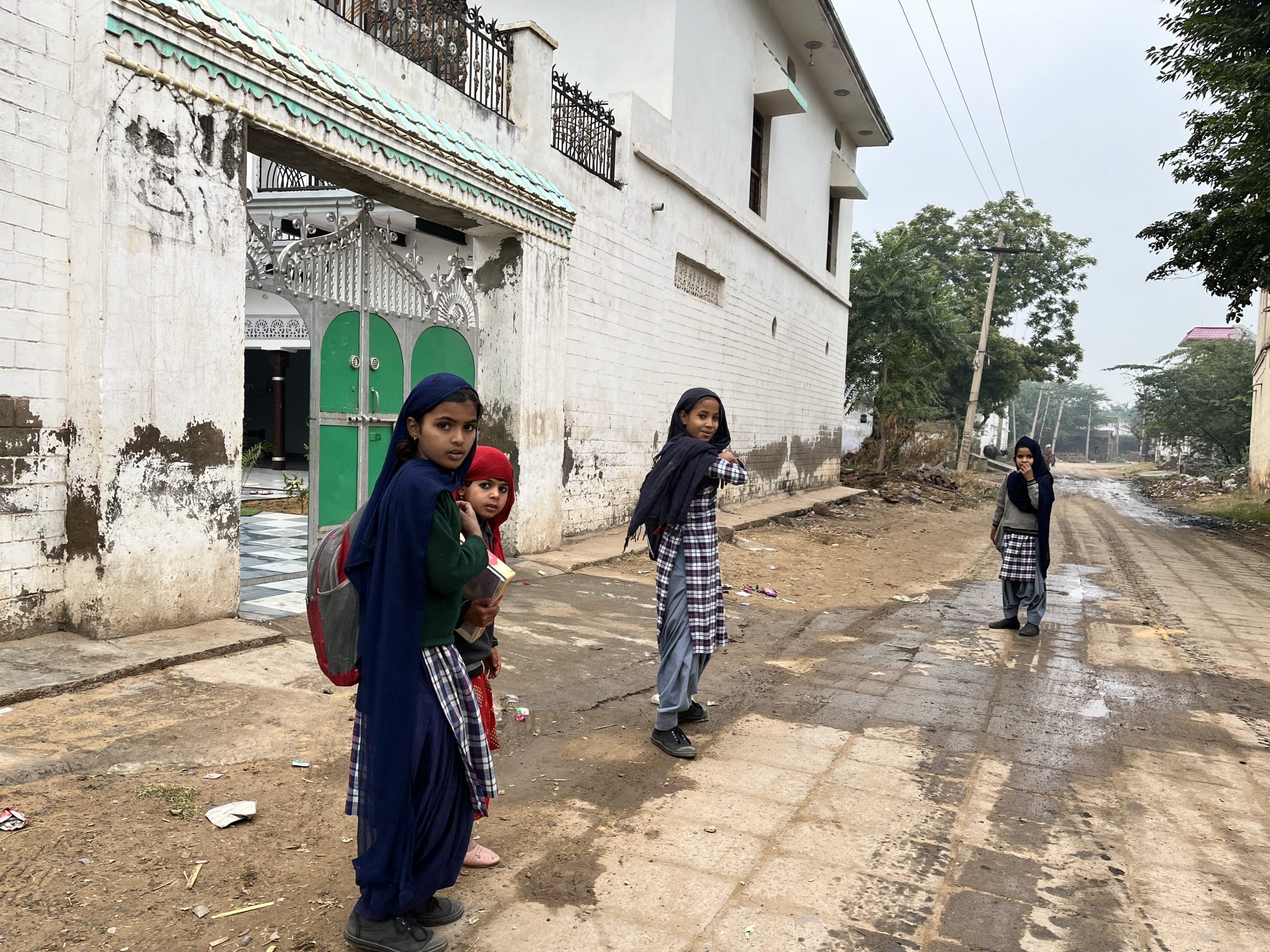
Social activist Sabir Qasmi, who sits in his office at Nuh bus stand, said, “Our religion permits us to marry girls after they get their first period when they are ready to reproduce. Across the Mewat belt, girls were married at 15-17. But now we have raised that to 16-18. This new law is against the societal norms and women’s choices too.”
While in Jind and other parts of Haryana, young women are strongly standing up for the new law, women in Nuh are standing by what their men are saying.
Thirty-year-old Rashida, the mother of 11-year-old Mumtaz, was angry with the government’s interference in marriage.
“Ladki sayani ho jaye tab shadi kar deni chahiye. Hum 16 umra tak aate aate shadi ka sochne lagte hain. 21 saal tak toh budhi ho jayegi chhori. 100 saal aage ki baat kar rahi hai sarkar (We start thinking of marrying off our daughters when they turn 16. At 21, they would have turned into an old woman. The government is thinking 100 years ahead),” she commented.
Halima and Aamir, who got their 18-year-old daughter Ismail engaged just a few days ago, echoed a similar sentiment. Ismail, hiding behind her mother when ThePrint visited their home in Ghaghas village on Tuesday, still had henna on her hands.
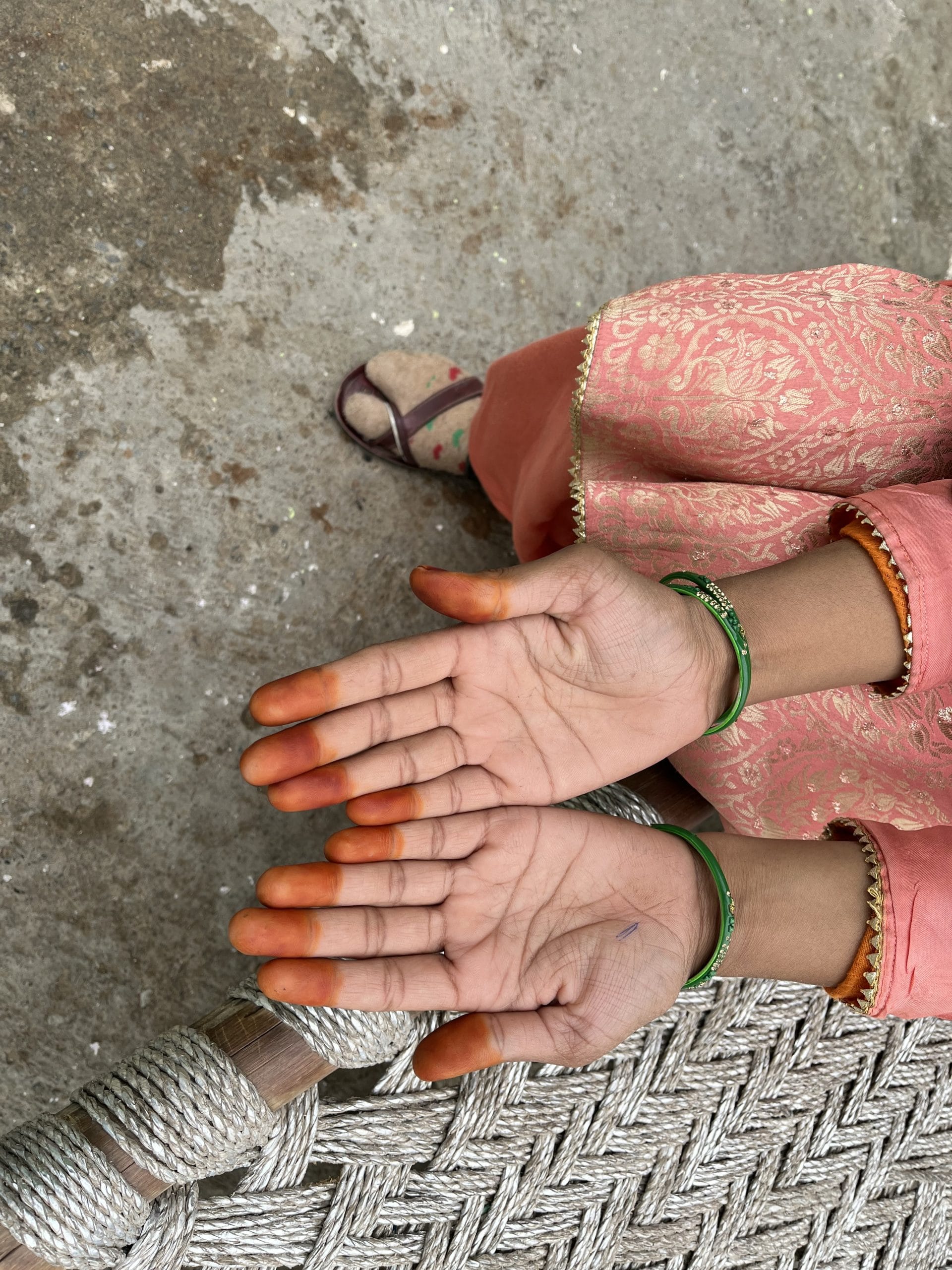
“We can’t wait for three years. It looks like hundred years. Our daughters need to protect themselves from bad influences.”
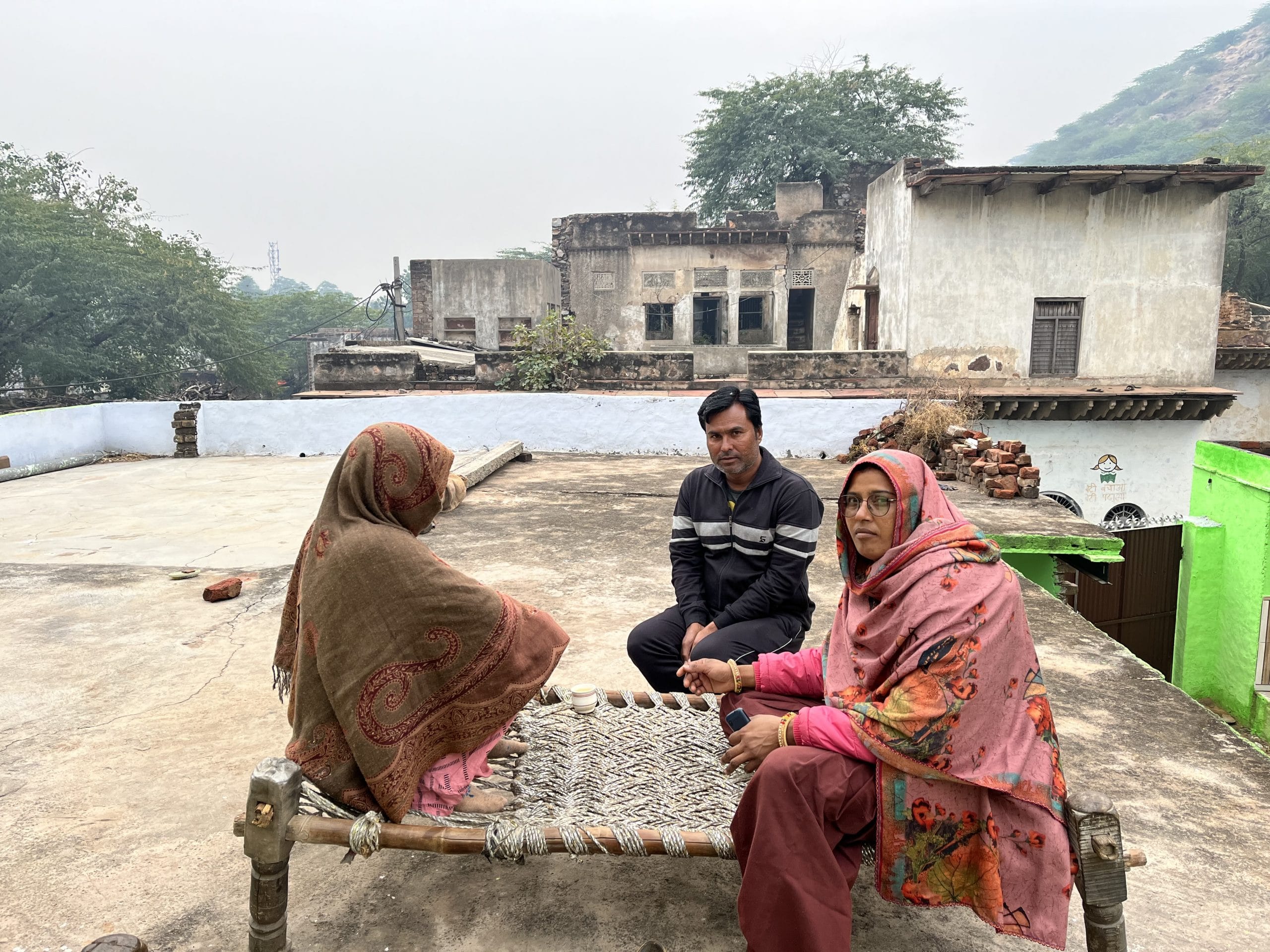
Around this time of the year, local journalists say Muslims usually don’t hold marriage ceremonies. But the fear of this law is now forcing them to marry off their daughters in a hurry.
Families are resorting to newer methods of marriage. Nikahs are being solemnised over phone and the brides being sent to their sasural in a car without grand barats. This helps them avoid administration’s crackdown on such marriages.
Also read: ‘Mol ki bahuein’ — the women Haryana’s men buy as brides
Meerut with a counter view, barely
Meanwhile, in Uttar Pradesh’s Meerut, Sunil Jaglan, founder of Selfie with Daughter movement, held a Lado panchayat on 25 December. It was attended by more than 700 women, including girls as young as 7 years old who along with a 65-year-old woman countered the views of Khaps and Ulemas of Mewat.
Women across age groups all vowed not to vote for the candidates opposing the bill.
“It is the antithesis of the Khap panchayats with a male face. Lado panchayat is parallely held focusing on women’s education, health, financial independence and basic rights. Women take the lead, we are mere organisers,” Jaglan said.
The Khaps targetted Jaglan and his volunteers for “constantly corrupting society with progressive ideas”. In Meerut’s Hashimpura locality, 21-year-old Iqra and some other women joined hands with hundred others in the Lado panchayat.
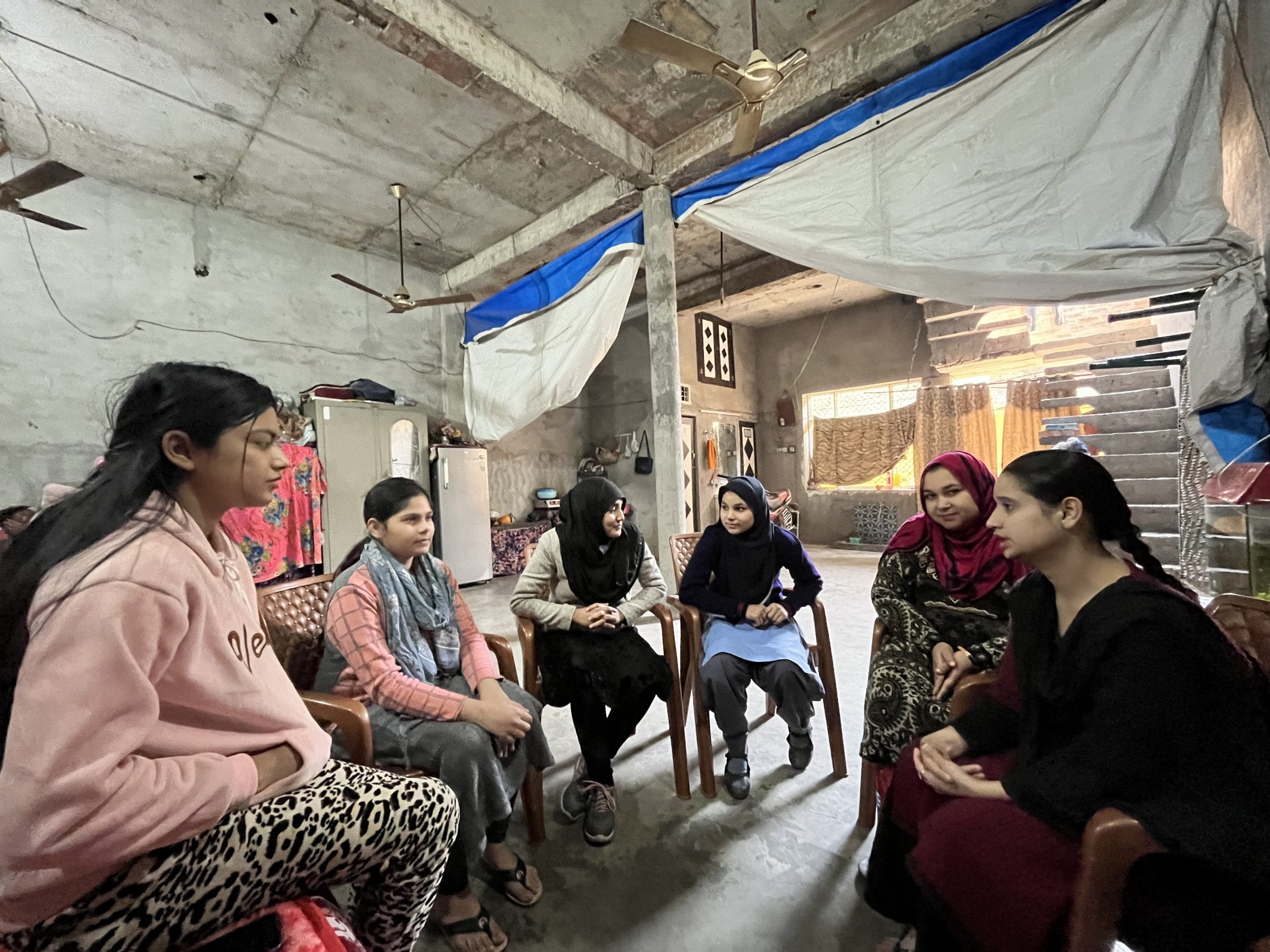
Twenty-three-year-old Afreen, who got married three years ago, took the mic at the stage to share her experience, “At a young age, we are not physically, emotionally and mentally mature to go into marriages. Many women develop serious health issues after conceiving at an early age. No one discusses these women-related matters.”
In Meerut, locals say the average marriage age for women is around 20 in the Muslim community.
“Unlike other areas where literacy rate is bad, we prefer sending our daughters for education,” 45-year-old Sageena said. Her daughter, 13-year-old Alisha, was present at the Lado panchayat. However, the use of mobile phones, elopement and sexual autonomy dominate the conversations among men here too, despite advocating for the raise in legal marriage age.
Responding to this fear, 20-year-old Ilma, a resident of Hashimpura Mohalla, said, “Education and choosing a partner are equally important decisions in one’s life. I don’t think we should shame those girls who have life partners.”
(Edited by Prashant)



